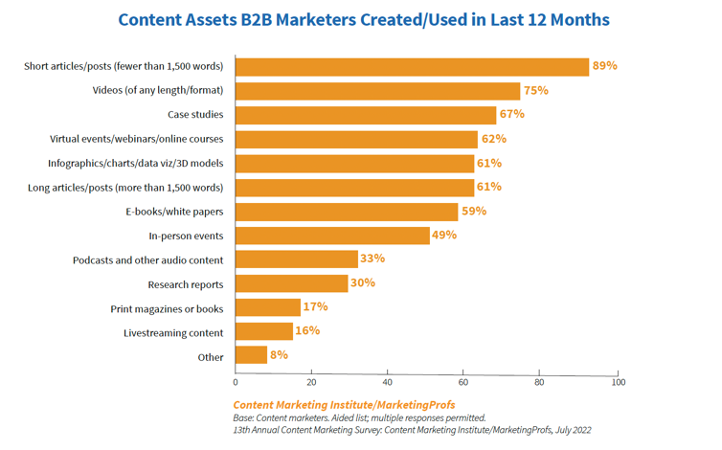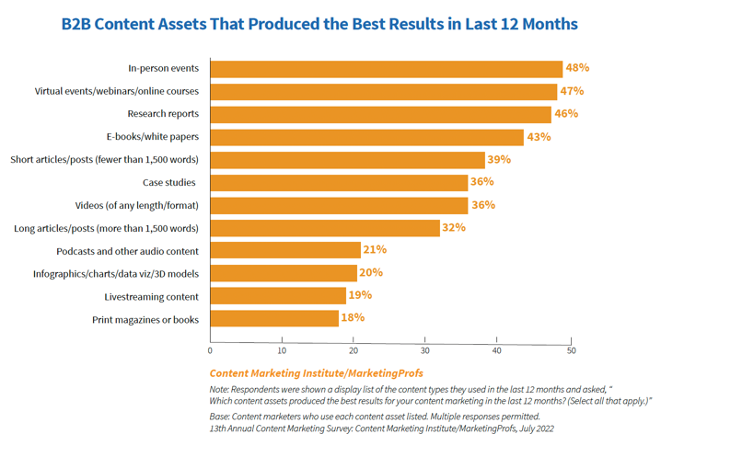With all of us having so many decisions to make every day, relying on conventional wisdom can be a time saver. Of course, we assume the sources of such wisdom are smarter than we are—that’s what allows us to be sanguine as we leave our decisions to others.
So it’s understandable that many companies have embraced conventional wisdom when it comes to thought leadership and content marketing. Producing a steady stream of quality content is a massive undertaking, so following standard strategies and approaches eliminates a ton of already-stretched time and resources.
The problem is that, too often, conventional wisdom is flat-out wrong. And when it comes to investing in content marketing, it should be approached with a reasonable dose of skepticism rather than viewed as a convenient shortcut.
Our own skepticism is the impetus for our content innovation research and analysis, on which Luke Collins has written and shared some initial insights (with much more to come). As part of this effort, my colleague Annie Hanigan and I dug into how B2B companies are approaching thought leadership and content marketing. We quickly understood why companies may default to the tried-and-true: conclusions varied across existing research and were often contradictory.
Two charts from the Content Marketing Institute’s 2023 survey on B2B content marketing illustrate the sometimes yawning gap between where companies put their money and what audiences actually want. The top three formats used by marketers were short articles, videos, and case studies (Exhibit 1). Conventional wisdom reinforces these choices: people have short attention spans, would prefer not to read, and want easy-to-grasp facts when making decisions about B2B products and services.
Exhibit 1
Where B2B marketers put their content money …

Yet one look at the effectiveness of different content formats paints a dramatically different picture. High-touch, more personal assets (in-person events and webinars) lead the way, with research reports and white papers close behind. Meanwhile, the formats marketers favor are bunched in the middle of the pack (Exhibit 2).
Exhibit 2
… is very different to what users actually want

So what’s causing the disconnect? Our experience with clients offers us some clues, especially with a couple of content types. Creating value with lengthier formats such as reports require significant resources, the involvement of deep subject-matter experts, and truly distinctive insights. It can feel like a huge commitment—because it is—and that reality often leads comms and marketing teams to default to shorter formats. They present a more expedient path.
Videos are popularly viewed as a more engaging format with broader reach, and senior partners may consider appearing in a video as a reward for their expertise. But for meatier topics based on data and analysis, videos often aren’t ideal: going into the necessary depth takes too long, at which point many viewers may have already tuned out.
How can B2B companies more accurately match their investment in content assets with the preferences of their audiences? Three actions can help:
- Regularly poll your target audience
Too many companies don’t really understand what their intended audience wants, so they rely on standard metrics (such as page views) to determine whether a piece of content hit the mark. Better, more accurate approaches are short surveys, focus groups, and online polls that give content marketers a direct window into the opinions and preferences of end consumers. Or simply asking a client over a drink. You don’t know what you don’t know—and you definitely won’t know if you don’t bother to ask.
- Offer multiple paths into content
Your target audience is not a monolith. Yet too many companies offer insights in a 2,500-word white paper and expect consumers to churn through it. For every person who prefers to listen to a podcast, for example, you may find two who view reading the transcript as a better use of their time. Giving people different ways to explore a topic isn’t a novel idea—it’s the rationale behind creating a short executive summary of an 80-page report. Well-placed bets on flagship content that can be repurposed in different formats—infographics, chart packs, blog posts, and interviews with experts about the insights—can not only expand the audience but also extend the shelf life of your ideas.
- Rethink your metrics and calibrate accordingly
We’ve written before about the difficulty of calculating ROI on thought leadership, and many companies may rely on select metrics that tell only part of the story. At worst, they may default to defining success by inputs—the number of articles and blog posts published—rather than the true reach and impact. And the other part about challenging conventional wisdom is letting go of performance metrics that may not accurately reflect how people are engaging with content. In the past, website traffic was one of the go-to signals of success for a given piece of content. But today, people are more likely to continue scrolling through their LinkedIn feed, browsing other social media sites, or picking articles from a news aggregator app. Rather than working to pull people from those channels to your site, consider meeting them where they are and focusing more on how your content stands out in those spaces. You may not be able to rely on site traffic, but you’ll end up with a new set of metrics that guide your investments and approaches.
We’re not saying all conventional wisdom about content marketing is wrong. But not all content is of equal quality, audiences vary dramatically, and objectives are unique to each company. Taking these three actions can help organizations begin to focus on more effective content that’s fit for their individual purpose. When that happens, more often than not we find companies can toss convention aside and place smarter, informed bets.



